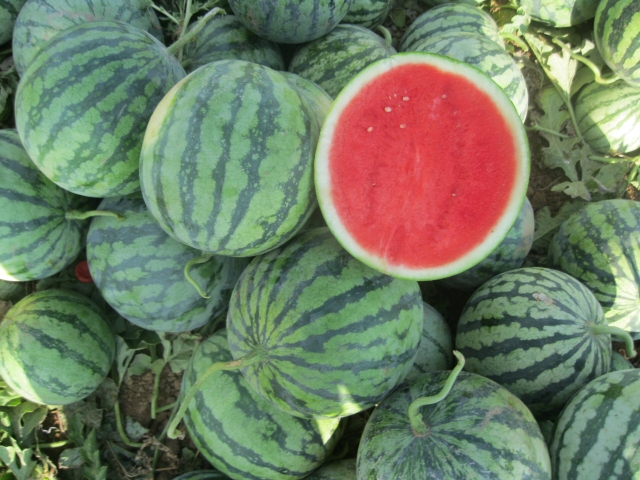Watermelon was given its name due to the large amounts of water needed to properly grow; Israeli agricultural technologists had already perfected the seedless variety of the refreshing summer fruit, and now a new Israeli agricultural innovation is giving the melon a good reason for a new name, while making it possible for drought-ridden areas to grow the sweet treat.
Although it is considered one of the symbols of the hot Israeli summer, the watermelon does not really take droughts and other climate changes into account and requires a lot of water to grow. On average, each fruit consumes between 400 and 500 liters, around 120 gallons of water per fruit.
#FunFact: Israel is a leader in developing seedless watermelon 🍉. In the picture LaJoya variety by ORIGENE SEEDS pic.twitter.com/HVaetSTfVy
— Eretz Israel (@EretzIsrael) October 1, 2020
Due to what most call climate change, it's no wonder that the two new varieties of watermelons developed in Israel,which reduce water consumption up to 30% and still remain 10% sweeter, are a real hit.
The "Origene Seeds" company will present the new "Essence" and the "Maxima" watermelon strains at the Agromshov 2022 exhibition that will be held next month in Jerusalem.
Papagayo The first ‘green’ Tiger type mini seedless, in the world with intermediate resistance to Powdery Mildew, that will grow in your field with the minimum control required.
— MoTi Shmueli (@MotiShmueli) June 14, 2022
In the last decade, Origene Seeds watermelon-breeding program has focused on…https://t.co/edvXQqB47m
The new varieties, which were recently planted in the hard-lands of the Golan Heights and in the Aravah desert, are the result of more than a decade of research and development.
As part of the process, Origene focused on the plant's ability to regulate the amount of water it loses through the leaves of the watermelon plant and the volume of the root system.
A combination of the two indicates the variety's resistance to drought conditions. Despite their great efficiency in water utilization, the quality of the crop produced by the new varieties is similar to that obtained under the conditions of a full irrigation regime, and the sweetness of the fruit is even more intense as a result.
Watermelon field in Israel... pic.twitter.com/gUwai56pel
— 🌊🌊Raymond Alvarado, LLM🌊🌊 (@Raymond_LLM) August 7, 2022
These new studies make the new strains a win-win situation for not just drought-plagued regions but for the entire globe as a means to conserve fresh water, which is becoming more of a commodity as climate change alters the earth's ecosystem.
La empresa israelí OriGene Seeds desarrolló una nueva variedad de sandía 🍉 que consume 30% menos agua y fertilizantes mientras mantiene su sabor, calidad y cantidad.
— Israel En Peru (@IsraelinPeru) August 19, 2022
Ya se cultivan en #Israel y son el resultado de más de una década de trabajo científico y de investigación. pic.twitter.com/MPsKmBDyFw
In Israel, about 61 thousand acres of watermelons are grown annually, and the water required to irrigate them is more than ten million cubic meters. The cost of watering all the watermelon areas in Israel during the growing season is about 28 million NIS; researchers estimate that using the new variety will reduce it to below 19 million at least, with even more savings possible over time.
Dr. Eyal Vardi, CEO of Origene Seeds, said: "The global climate changes will lead to significant upheavals in world agriculture and require the necessary adjustments. In light of all this, we have started developing and cultivating new varieties adapted to desert conditions."


